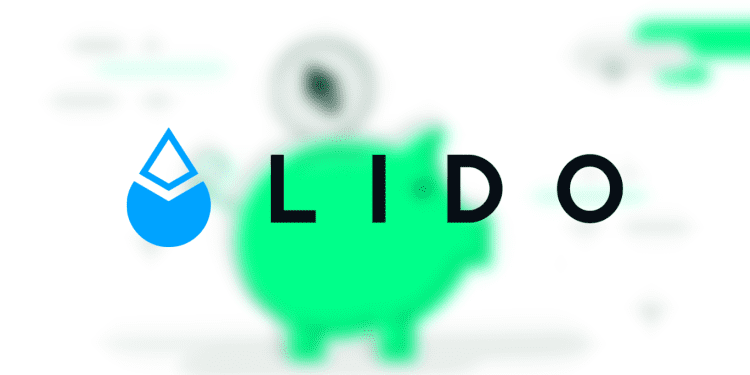- Lido Finance submitted a proposal to create a tiered Rewards-Share Program.
- The program involves three phases: onboarding, reward sharing, and offboarding.
- The program lasts twelve months, and participants will be rewarded based on the amount of ETH they stake through the Lido protocol.
The Lido Finance DAO, a liquid staking DeFi protocol for Proof-of-Stake based cryptocurrencies, has approved a proposal via Snapshot to introduce a rewards-share program to encourage market participants to stake their Ethereum (ETH) using the Lido protocol.
The proposal, which closed for voting on June 29, 2023, entitled “Tiered Rewards Share Program: A Sustainable Approach to stETH Growth,” outlines a shared rewards program that seeks to incentivize individuals who may not prioritize staking or be involved with Lido without the allure of rewards.
By implementing tiered rewards and a Committee to manage the program, Lido aims to align incentives with ETH staked through its protocol and ensure the sustainability of the overall ecosystem.
Program Details
Onboarding Phase
The rewards-share program operates in three phases. The initial phase, known as onboarding, involves an application and evaluation process. Prospective participants must meet eligibility criteria, including wallets, institutions, protocols, crypto services, and custody services. This includes demonstrating a potential to contribute at least 2,500 ETH to Lido within 12 to 24 months.
For those who do not meet the minimum contribution level, the committee can assess applications from promising projects that show potential for driving growth to the Lido protocol.
Participants must commit to promoting Lido alongside alternative liquid staking tokens (LSTs) and comply with Lido’s Terms of Use. The size of the rewards-share pool, the amount, and the terms of the staked ETH (stETH) token reward are determined by the DAO, which can modify them through a DAO vote. The program has no specific time frame and ends when the rewards pool is exhausted.
Reward Share Phase
Once onboarded, participants become eligible for rewards-share based on tiered percentages of the DAO’s 5% share of staking rewards. The tier levels are determined by the cumulative ETH staked by participants and users through their products and services. The percentages range from 30% for staking amounts between 0 and 50,000 ETH and up to 50% for staking 700,000 ETH or higher.
The starting tier for participants is determined by the amount of ETH staked through their products and services before joining the rewards-share program. The rewards-share calculation considers the participant’s ETH contribution, tier level, and the staking duration, lasting 12 months from when each ETH was staked.
Certain activities, such as unstaking, selling stETH on exchanges, cycle-staking, and providing one-sided liquidity on DEXs, could result in disqualification from rewards-share for the stETH involved in those activities. However, participants engaged in disqualification activities are not disqualified from the program outright unless their stETH is repeatedly engaged, in which case they may be disqualified completely.
The proposal introduces a social unstake deduction mechanism to ensure fairness and address the tracking challenges associated with unstaked stETH. This deduction indirectly adjusts eligible stETH for rewards-share by considering the total unstaked stETH during a calendar month and the proportion contributed by rewards-share participants.
Participants can avoid the social unstake deduction by using whitelisted addresses, which allow their stETH to be exempt from the deduction but subject to direct unstake deduction if withdrawals occur.
Off-boarding Phase
The offboarding phase marks the termination of a participant’s status in the program. It can be triggered by voluntary departure, non-renewal after 12 months of participation, disqualification, DAO discontinuation through a vote, or exhaustion of the rewards pool.
Participants whose status is terminated will still receive rewards-share for stETH earned before termination, as long as the rewards pool remains available. The Rewards Share Committee, composed of designated members, will control a multi-signature wallet with authority to whitelist, filter, and distribute stETH protocol rewards. The committee will operate within the guidelines and policies set by the DAO.
Program Benefits
Lido’s proposal encourages widespread participation in staking through its rewards-share program. By offering incentives and aligning the interests of participants with the protocol, Lido seeks to strengthen the security and decentralization of the Ethereum network.
One of the primary benefits of the rewards-share program is that it allows participants to earn additional stETH tokens, representing their staked ETH in the Lido protocol. These tokens can be used in various DeFi applications and provide liquidity to the Ethereum ecosystem.
By earning stETH tokens, participants contribute to the network’s overall security and gain exposure to the potential rewards and benefits associated with staking.
Moreover, the tiered rewards structure ensures that participants are rewarded proportionally for their contribution. Those who stake larger amounts of ETH or have a significant impact through their products and services will receive a higher percentage of the rewards pool. This design encourages active participation and creates a fair and competitive environment among participants.
The Rewards Share Committee is crucial in managing the program and ensuring its smooth operation. Composed of designated members, the committee oversees the distribution of stETH rewards and maintains the program’s integrity. Using a multi-signature wallet, the committee exercises control and transparency over the rewards distribution process, ensuring participants receive rewards.
Conclusion
This proposal opens up opportunities for wallets, institutions, protocols, and other crypto services to engage with the Lido protocol and contribute to the growth of the Ethereum ecosystem through dynamic staking options.
Through the program, Lido aims to foster collaboration, innovation and increased engagement within the DeFi community. Lido Finance’s proposal to introduce a rewards-share program is a strategic move to incentivize participation in staking and promote the overall growth and security of the Ethereum network.
By aligning incentives, offering tiered rewards, and establishing a dedicated Committee, Lido aims to attract a diverse range of participants and ensure the sustainability of the rewards program. As the DeFi ecosystem continues to evolve, initiatives like the rewards-share program play a vital role in driving adoption, decentralization, and the long-term success of decentralized finance.














